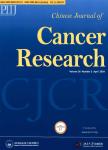THE SIGNIFICANCE OF P53 GENE MUTATIONS AND EXPRESSIONS IN HUMAN COLORECTAL TUMORS
THE SIGNIFICANCE OF P53 GENE MUTATIONS AND EXPRESSIONS IN HUMAN COLORECTAL TUMORS作者机构:Department of Surgery Xinhua Hospital Shanghai Second Medical University Shanghai Department of Surgery Ruijin Hospital SSMU Shanghai Department of Pathology SSMU Shanghai Department of Hematology Ruijin Hospital SSMU Shanghai
出 版 物:《Chinese Journal of Cancer Research》 (中国癌症研究(英文版))
年 卷 期:1996年第8卷第2期
页 面:109-112页
核心收录:
学科分类:1002[医学-临床医学] 100214[医学-肿瘤学] 10[医学]
主 题:Colorectal neoplasms p53 gene Mutation,Expression PCR-SSCP
摘 要:Using a polymerase chain reaction-single strand conformation polymorphism (PCR-SSCP) approach we analyzed 18 human colorectal adenocarcinomas for mutations in exons 5,6,7,8 of p53 gene. At the same time,p53 gene product expression was studied immunohistochemically in these 18 case in frozen sections. The expression of p53 protein was also immunohistochemically studied in formalin-fixed paraffin embeded spccimens of 76 colorectal adenocarcinomas and 112colorectal polyps. Eigbt out of 18 cases (44%) showed a variant band indicative of a mutation in exons 5-6 of p53gene 7 out of 8 cascs (88%) with p53 gene mutations were positivelystanined for P53. There was no significant correlation between p53. expression and clinicopathological manifestations and prognosis. but the strongest staining was cncountered in those cases with well differentiated and early stage adenocarcinomas,while weaker staining was encountered in Poorly differentiated and mucoid adenotarcinomas. p53expression was not observed in proliferative polyps and adenomas with low grade dysplasia. The frequency of p53expression reached 88% (p0.001) when adenoma showed malignant change. Aiuong three types of adenomas, p53 expression was most frequent in villous type (P0.05). The frequencies of p53 expression in adenoma, adenoma with malignant change and adenocarcinoma were 4%, 88% and 51% *** indicate that genetic changes of p53 gene play an important role in the transformation from benign adeuoma to adenocarcinoma. p53 immunohistochcmistry can be used as a surrogate marker for p53 gene mutation for early discovery of colorectal adenocarcinomas.



